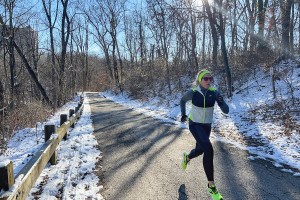Exercise Could Be a Legitimate Form of Therapy, New Study Shows

Shutterstock
We all know people who use exercise to clear their minds and, in some cases, to maintain their sanity. And new research shows that doing so could do the brain even more good than you might expect: A small study published in Cognitive Behaviour Therapy found that running can help to reduce the symptoms of post-traumatic stress disorder, Runner’s World reports.
Researchers at the University of Texas at Austin studied nine individuals suffering from PTSD who were assigned to two groups: The first group ran for 30 minutes before each of their therapy sessions over the course of 12 weeks, and the second group just went to talk therapy.
At the end of the 12 weeks, researchers found that the exercise-plus-therapy group had increased levels of the brain protein brain-derived neurotrophic factor (BDNF) — a protein that helps the brain to adapt to stressful environments and repair itself, therefore aiding in the recovery process after a traumatic event — while the second group’s levels of BDNF had remained the same. The first group also had a larger drop in their PTSD symptoms over the course of the study, which researchers attribute to the rise in BDNF, which came as a result of exercise.
As the study leader told Newswire, “It’s exciting that something so straightforward — running — can have such a large impact on the treatment of PTSD.” But you’re probably thinking, Well, there were only nine people involved. And you’re right: The study was small. So now, researchers in Canada are working on a larger, three-year study with 120 participants who will be designated to four groups — exercise-only, therapy-only, exercise-plus-therapy and a wait-list control group — to see if their findings hold up.
As the lead researcher of the new study told Newswire, “This is a very encouraging area of research. Another recent trial by our group, as well as the findings from Powers et al. and others, suggest that aerobic exercise may not only enhance treatment outcomes, but it may be a viable stand-alone PTSD treatment.” So the researchers are optimistic that running — or any aerobic exercise for that matter — could be a legitimate form of therapy. Pretty cool, huh?
Like what you’re reading? Stay in touch with Be Well Philly—here’s how:
- Like Be Well Philly on Facebook
- Follow Be Well Philly on Twitter
- Follow Be Well Philly on Pinterest
- Get the Be Well Philly Newsletter


